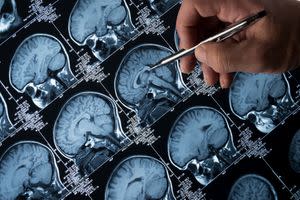BU researchers using brain network connections to identify those at high-risk for suicide

New research from Boston University scientists could open the door to new treatments that can reduce suicide risks.
Boston University and Veteran Affairs researchers have found that brain network connections involved in cognitive and self-referential thought processing differed in veterans with a history of suicide attempts compared to veterans with similar physiological symptoms but without suicide attempts.
Veterans involved in the study completed a “resting” MRI scan to analyze the communication between brain region networks. The study then identified a group of veterans who reported a suicide attempt within two years of the scan but had not done so in any previous assessment.
The scientists then identified another group of veterans with similar symptoms of depression and PTSD but did not report a suicide attempt. Comparison between the two revealed that brain connectivity between cognitive control and the self-referential processing networks was dysregulated in the group that attempted suicide. BU says the brain connectivity signature was present both before and after the suicide attempt.
“Our study provides evidence that this brain connectivity marker may be identifiable before a suicide attempt, suggesting that it could help identify those at risk for suicide. This could also lead to new treatments that target these brain regions and their underlying functions,” explained corresponding author Audreyana Jagger-Rickels, PhD, principal investigator in the National Center for PTSD at the VA Boston Healthcare System and assistant professor of psychiatry at Boston University Chobanian & Avedisian School of Medicine.
According to BU, one of the challenges in assessing suicide risk is that it relies heavily on self-reporting.
“As a result, interventions to reduce suicide risk are limited to people who feel comfortable enough to disclose (self-report) suicidal thoughts and behaviors. Identifying measures that do not require self-disclosure of suicidal thoughts and behaviors may help us identify people who are overlooked, and may also aid in the development of novel treatments targeting the brain mechanisms underlying suicidal thoughts and behaviors,” said Jagger-Rickels.
The study also indicated that connectivity in the right amygdala, a brain region important for fear learning and trauma, differed among the two groups after a suicide attempt.
“This suggests that there are brain changes that occur after a suicide attempt, which could be related to the stressors surrounding a suicide attempt or due to the trauma of the suicide attempt itself. This would indicate that suicide attempts themselves impact the brain, which could increase future suicide risk,” Jagger-Rickels added.
Download the FREE Boston 25 News app for breaking news alerts.
Follow Boston 25 News on Facebook and Twitter. | Watch Boston 25 News NOW
